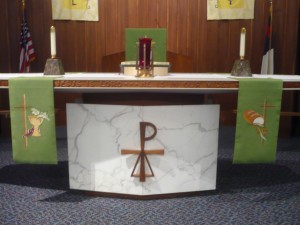 Simple and Uncomplicated
Simple and Uncomplicated
We believe “what we believe” should be simple and as uncomplicated as possible.
We believe all people are welcome in God’s family, so we welcome all
people to St. Marks.
We believe there is one God who has revealed himself in three ways;
Father, Son and Holy Spirit. Along with all Christians, we call this the Trinity.
We believe the Bible tells us about God’s relationship with us
throughout history.
We believe people mess up; we do wrong things. We call this sin.
This hurts our relationship with God and others. But these broken
relationships are made right through forgiveness.
We believe the forgiveness of God comes through the death of Jesus on
the cross. Nothing else. This forgiveness is pure gift, given to all
who simply believe Jesus died for them. We don’t have a list of rules
to follow in order to be loved and accepted by God. God accepts you
exactly as you are.
We believe you don’t have to be “good enough to attend church” before
you come to St. Marks. You don’t have to wear the right clothes, say
the right words or do all the right things before you come to St.
Marks. We hope you’d feel free to ask questions and learn about God’s
gifts, at St. Marks.
Please go to ELCA.org, Google “Lutheran” or read below for more information.
We welcome you!
*************************************************************
Take a Deeper Look
The ELCA, along with other Lutheran churches, can trace its roots directly to the Protestant Reformation that took place in Europe in the 16th century. Martin Luther, a German monk, became aware of differences between the Bible and church practices of the day. His writings, lectures and sermons inspired others to protest church practices and call for reform.
By the late 1500s the Reformation had spread throughout Europe. Followers of Martin Luther’s teachings were labeled “Lutherans” by their enemies and adopted the name themselves. St Marks invites you to join the followers of Martin Luther by visiting or joining our congregation. Our wide range of ministries (see links above) or our weekly services are a great place to begin your fellowship with others who seek to make the world a better place.
Lutherans believe in the Triune God. God created and loves all of creation — the earth and the seas and all of the world’s inhabitants. We believe that God’s Son, Jesus Christ, transforms lives through his death on the cross and his new life, and we trust that God’s Spirit is active in the world.
We are part of God’s unfolding plan. When we gather for worship, we connect with believers everywhere. When we study the Bible or hear God’s word in worship, we are drawn more deeply into God’s own saving story.
The convictions shared by Christians from many different traditions are expressed in statements of belief called creeds.
These ecumenical creeds that Lutherans affirm and use in worship confess the faith of the church through the ages and around the world.
The Confession of Faith of the Evangelical Lutheran Church in America is part of our founding constitution. The ELCA accepts the following creeds as true declarations of the faith of this church:
- This church confesses the Triune God, Father, Son, and Holy Spirit.
- This church confesses Jesus Christ as Lord and Savior and the Gospel as the power of God for the salvation of all who believe
- Jesus Christ is the Word of God incarnate, through whom everything was made and through whose life, death, and resurrection God fashions a new creation.
- The proclamation of God’s message to us as both Law and Gospel is the Word of God, revealing judgment and mercy through word and deed, beginning with the Word in creation, continuing in the history of Israel, and centering in all its fullness in the person and work of Jesus Christ.
- The canonical Scriptures of the Old and New Testaments are the written Word of God. Inspired by God’s Spirit speaking through their authors, they record and announce God’s revelation centering in Jesus Christ. Through them God’s Spirit speaks to us to create and sustain Christian faith and fellowship for service in the world.
- This church accepts the canonical Scriptures of the Old and New Testaments as the inspired Word of God and the authoritative source and norm of its proclamation, faith, and life.
- This church accepts the Apostles’, Nicene, and Athanasian Creeds as true declarations of the faith of this church.
- This church accepts the Unaltered Augsburg Confession as a true witness to the Gospel, acknowledging as one with it In faith and doctrine all churches that likewise accept the teachings of the Unaltered Augsburg Confession.
- This church accepts the other confessional writings in the Book of Concord, namely, the Apology of the Augsburg Confession, the Smalcald Articles and the Treatise, the Small Catechism, the Large Catechism, and the Formula of Concord, as further valid interpretations of the faith of the Church.
- This church confesses the Gospel, recorded in the Holy Scriptures and confessed in the ecumenical creeds and Lutheran confessional writings, as the power of God to create and sustain the Church for God’s mission in the world.
The Apostles’ Creed
About the Creed
The Apostles’ Creed as we now have it dates from the eighth century. But in truth its roots are in the “Old Roman Creed,” which was used in some parts of the ancient church as early as the third century. Before the Old Roman Creed, in turn, were variations rooted in the New Testament itself. While this creed does not come from the apostles (Jesus’ followers sent to share the good news), its roots are apostolic (in keeping with the teaching of the New Testament apostles). The creed describes the faith into which we are baptized and therefore is used in the rites of Baptism and Affirmation of Baptism.
The Apostles’ Creed
I believe in God, the Father almighty, creator of heaven and earth.
I believe in Jesus Christ, God’s only Son, our Lord, who was conceived by the Holy Spirit, born of the virgin Mary, suffered under Pontius Pilate, was crucified, died and was buried; he descended to the dead.* On the third day he rose again; he ascended into heaven, he is seated at the right hand of the Father, and he will come to judge the living and the dead.
I believe in the Holy Spirit, the holy catholic Church, the communion of saints, the forgiveness of sins, the resurrection of the body, and the life everlasting. Amen.
*or “he descended into hell,” another translation of this text in widespread use.
Text prepared by the International Consultation on English Texts (ICET) and the English Language Liturgical Consultation (ELLC). Reproduced by permission.
The Nicene Creed
About the Creed
The Nicene Creed was first adopted by church leaders in 325 at the First Council of Nicaea. Later that century, at the Council of Constantinople (381) some minor changes were made and it was again reaffirmed at the Council of Chalcedon (451). This ecumenical creed is the most widely accepted creed in the Christian faith and it is an essential part of the doctrine and liturgy of Lutheran churches. Historically it has been used at Holy Communion on Sundays and major feasts.
The Nicene Creed
We believe in one God, the Father, the Almighty, maker of heaven and earth, of all that is, seen and unseen.
We believe in one Lord, Jesus Christ, the only Son of God, eternally begotten of the Father, God from God, Light from Light, true God from true God, begotten, not made, of one Being with the Father; through him all things were made. For us and for our salvation he came down from heaven, was incarnate of the Holy Spirit and the virgin Mary and became truly human. For our sake he was crucified under Pontius Pilate; he suffered death and was buried. On the third day he rose again in accordance with the Scriptures; he ascended into heaven and is seated at the right hand of the Father. He will come again in glory to judge the living and the dead, and his kingdom will have no end.
We believe in the Holy Spirit, the Lord, the giver of life, who proceeds from the Father and the Son,* who with the Father and the Son is worshiped and glorified, who has spoken through the prophets. We believe in one holy catholic and apostolic Church. We acknowledge one Baptism for the forgiveness of sins. We look for the resurrection of the dead, and the life of the world to come. Amen.
* Or, “who proceeds from the Father.” The phrase “and the Son” is a later addition to the creed.
Text prepared by the International Consultation on English Texts (ICET) and the English Language Liturgical Consultation (ELLC). Reproduced by permission.
